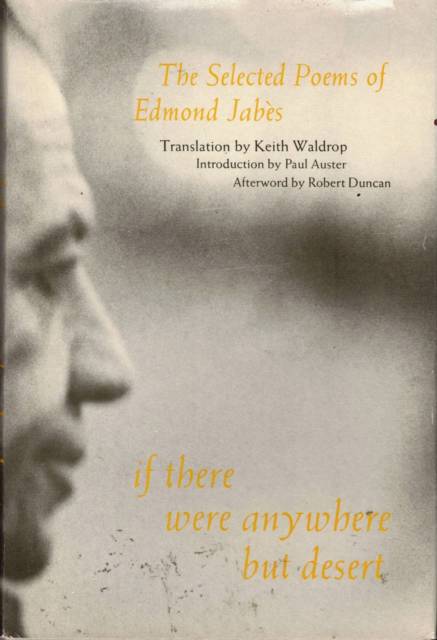
Door een staking bij bpost kan je online bestelling op dit moment iets langer onderweg zijn dan voorzien. Dringend iets nodig? Onze winkels ontvangen jou met open armen!
- Afhalen na 1 uur in een winkel met voorraad
- Gratis thuislevering in België vanaf € 30
- Ruim aanbod met 7 miljoen producten
Door een staking bij bpost kan je online bestelling op dit moment iets langer onderweg zijn dan voorzien. Dringend iets nodig? Onze winkels ontvangen jou met open armen!
- Afhalen na 1 uur in een winkel met voorraad
- Gratis thuislevering in België vanaf € 30
- Ruim aanbod met 7 miljoen producten
Zoeken
Omschrijving
This book is the first bilingual selection from the poetic works of Edmund Jabes, long acknowledged for the mastery of his work in the unique prose genre invented by him. "Jabes lives in the French language as if it were the Sea," writes Robert Duncan in the afterword, a truth accessible here both in the French originals and Keith Waldrop's extraordinary translations, drawn from Jabes' earliest and most recent poems. "Poetry was Jabes' proving ground," writes Paul Auster in the Introduction, "and as a careful reader of Keith Waldrop's translations will observe, the styles and themes that characterize The Book of Questions and The Book of Resemblances were already being explored by Jabes in the poems he wrote as a young man. One finds the same economy of reference, the same passionate lyricism, the same tendency toward aphorism, and the same preoccupation with the act of writing itself. Even the theme of exile, which plays such a vital part in the later prose books, is already present in these early poems: 'Always in a foreign country, the poet uses poetry as an interpreter.'" It is impressive to see how much the whole oeuvre of Jabes stands as a continuity and a completion from its first moments to these very recent poems, an inquiry into the nature of writing and being.
Specificaties
Betrokkenen
- Auteur(s):
- Uitgeverij:
Inhoud
- Aantal bladzijden:
- 124
- Taal:
- Engels
Eigenschappen
- Productcode (EAN):
- 9780882680521
- Verschijningsdatum:
- 1/01/2010
- Uitvoering:
- Hardcover
- Formaat:
- Ongenaaid / garenloos gebonden
- Afmetingen:
- 162 mm x 239 mm
- Gewicht:
- 399 g

Alleen bij Standaard Boekhandel
+ 41 punten op je klantenkaart van Standaard Boekhandel
Beoordelingen
We publiceren alleen reviews die voldoen aan de voorwaarden voor reviews. Bekijk onze voorwaarden voor reviews.











